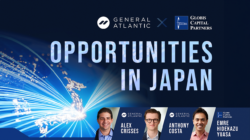Leading High Performing Remote Teams
How can leaders ensure that performance remains high in remote or hybrid-work environments?
Content Marketing
In this course, you’ll learn how compelling blogs, videos, podcasts, and other media can reach customers and drive sales. You’ll also learn steps for creating an effective content marketing plan, and some important ways to measure its impact and success.
Content marketing is a essential digital marketing strategy for companies looking to provide relevant and useful information to support your community and attract new customers.
Get started on your content marketing journey today.
Sustainable Innovation in Times of Disruption: Choices for a Better Society
There are opportunities for progress all around us. The key is to innovate on these opportunities sustainably.
To help identify most effective path forward, you'll need to gain a global perspective to these challenges in an open discussion. How can Japan and the world take action to create a more sustainable, innovative world? Where do you fit in?
It's time to find out.
Social Media & Digital Communications: Impact on Global Public Opinion
Social and digital media have dominated the communications industry for decades. But it's no secret that social media has the power to sway public opinion, and the way in which many companies use these platforms could be seen as manipulative.
What do companies need to be aware of when utilizing social and digital media? How can these mediums be used to better communicate strategically with the world?
Discover what top media and communications experts have to say.
CAGE Distance Framework
Want to expand overseas? The CAGE distance framework can help ensure you're constructing a solid global strategy in four areas: cultural, administrative, economic, and geographic. Learn how to leverage useful differences between countries, identify potential obstacles, and achieve global business success.
Servant Leadership
There's more to leadership than driving a team to profit. In fact, there's a word for looking beyond self-interest to prioritize individual growth: servant leadership. Try this course for a quick breakdown of what that is, how it works, and how it can lead to organizational success.
Strategy: Creating Value Inside Your Company
Have you ever wondered why certain companies are more successful than others? The answer is strategy: internal processes that control costs, allocate resources, and create value. This course from GLOBIS Unlimited can give you the tools you need for that strategic edge.
Strategy: Understanding the External Environment
To plan strategy on any level, you need to understand your company's external environment. In fact, your level of understanding can impact hiring, budgeting, marketing, or nearly any other part of the business world. Want to learn how to do all that? This course from GLOBIS Unlimited is the perfect first step!
Using Japanese Values to Thrive in Global Business
Japanese companies have unique cultural, communication, and operational challenges. But they also have values that have led to remarkable longevity. Check out this seminar to hear how these values help earn trust from overseas head offices and develop employees.
Marketing: Reaching Your Target
Every company works hard to get its products into the hands of customers. Are you doing everything you can to compete? In this course, you’ll find a winning formula to turn a product idea into real sales. Follow along through the fundamentals of the marketing mix and see how companies successfully bring products to market.
Basic Accounting: Financial Analysis
Want to compare your performance vs. a competitor? Or evaluate a potential vendor? Then you'll need to conduct a financial analysis. This course will teach you how to use three financial statements and evaluate financial performance in terms of profitability, efficiency, soundness, growth, and overall strength.
Career Anchors
What drives you to be good at your job?
Career anchors are based on your values, desires, motivations, and abilities. They are the immovable parts of your professional self-image that guide you throughout your career journey.
Try this short GLOBIS Unlimited course to identify which of the eight career anchors is yours!
Leadership with Passion through Kokorozashi
The key ingredient to success? Passion.
Finding your kokorozashi will unify your passions and skills to create positive change in society. This GLOBIS Unlimited course will help you develop the values and lifelong goals you need to become a strong, passion-driven leader.
“Do what you love and you’ll never work a day in your life.”
This old adage may be well-intentioned, but it certainly wasn’t written with a healthy work-life balance in mind. After a long, stressful day at work, it’s important to unwind by doing something that you enjoy. But when your career and your passion are one and the same, disconnecting may prove difficult.
While the recent remote work boom has provided many professionals with a great deal of flexibility, it has also brought challenges—namely, how or when to walk away at the end of the day. In a recent survey conducted by Groupon, 60% of respondents listed a lack of boundaries between their work and home lives as the reason for a poor work-life balance.
No matter how much you love what you do, maintaining that boundary and finding an outlet that’s separate from your job is essential to having a healthy work-life balance. This may be easier said than done, but it can be done. Journalist and diversity consultant Olivier Fabre shares his advice on how to tune out at the end of the day and focus on what matters.
“[Cut] out and just leaving everything for a while. [Pay] attention to yourself and your friends and family. I think that’s very important.”
Olivier Fabre
Transcript:
Is having a career plan important?
Olivier Fabre:
I think having a career plan is important because I wish I had one!
I literally was privileged to be able to find a job relatively right away after college, then moved to another job that I was more interested in after two or three years. I stayed in it for twenty-five years because I actually enjoyed it. I liked my work. I liked the company I worked for. But then, you don’t realize you’ve been there too long until it’s too late. And you need to have a plan B for everything, even if it’s just looking out for yourself or other jobs that may be important.
Even [when] a company [is] really the best fit, maybe you want to try something else. Challenge yourself to something else. It’s easy to be stuck in a company for very long because you’ve made very good friends and it’s a very good fit for you. You’re passionate about the work, and that’s great if you’re in charge of everything. But if you’re not, then you probably want to look to move on.
Eventually, just to follow, make sure you’re in charge of your career and the company—or rather, [that] somebody else is not.
Is work-life balance still important with passion projects?
Fabre:
I think it is. I think it is. It’s very easy to get completely absorbed by your job and ignore everything else. And at the end of the day, once your passion is over or has moved on or you’ve reached your goal, then you realize you have nothing else left around. Then it becomes difficult to catch up.
When I edit or I do something, I end up editing for hours and hours and I forget the time to eat, to go out, run, and whatnot. And I’ve got to force myself to stop and take a break and go out. And I actually try to walk at least an hour every day, even the middle of the day, because I can. Because I’m no longer in an office. And just to take that break and make sure I take care of myself and if I need to take care of other people at the time, then do that, as well.
Next Article
How to Deal with Work Stress
How can I avoid burnout?
Fabre:
Seriously, burnout is very—people need to take it seriously. I did not take burnout seriously enough. Even when I was younger, I thought I was young, I could play hard, work hard, and get everything done at the same time. And then your body just doesn’t allow you to do that anymore. Keeping yourself healthy, at least exercising once in a while. And also just ensuring that you’re switched off once in a while.
When I left my previous job, which was always keeping on top of the news, the first thing I did was turn off every notification for every news app I had. And it was so relaxing. And I realized that just that flow of information gets you on edge. And even if you’re somebody like me, who knows that the news is the news and it’s part of your work, it still stresses you out. And it really is a major factor to burnout, I think.
Cutting out and just leaving everything for a while. Paying attention to yourself, and your friends and family. I think that’s very important.



